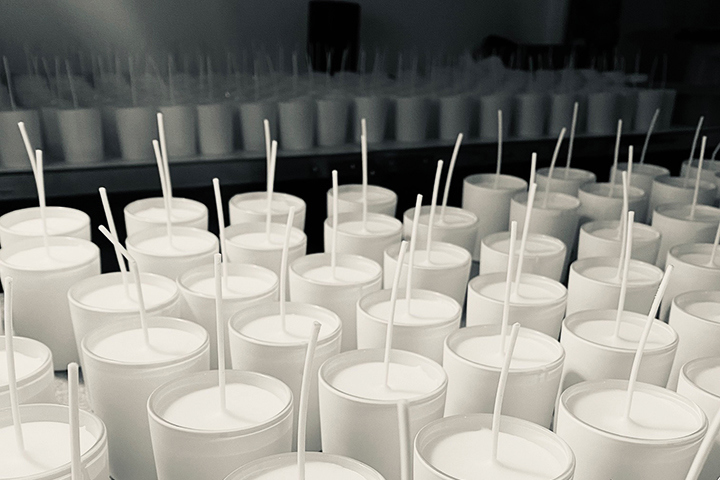
Making sense of scents – the power of scent marketing
10 December 2021
Ever since the beginning of time, people have used scents to stimulate emotions and reactions. Queen Cleopatra used to perfume her sails to declare her arrival, and ancient merchants used incense to create feelings of relaxation or alertness. What can today’s businesses and leaders learn from the past? The latest research in the field of fragrance suggests ground-breaking ways to use scents to affect both customers and employees. The Link spoke to Christina Johannesson, founder of SCC member and candle producer Ljuset, about this rising trend.
We all experience them, emotions and memories that are triggered when we encounter a specific scent. They can be personal, such as smelling a perfume that reminds you of your grandmother, or shared with others, such as feeling hungry when walking past a bakery in the morning. These reactions are both universal and, most of the time, unconscious.
Christina Johannesson has long been interested in the power of fragrances and decided to use it on herself when being prevented from travelling back to Sweden for Christmas in 2020. “During last year’s lockdown, I was not able to travel back to Sweden from Scotland to celebrate Christmas with my family – which I normally do every year. This led me to the idea of creating fragrance candles which reminded me of a Nordic Christmas – like gingerbread and mulled wine.”
This idea gave birth to Ljuset – a business providing scented candles. “I know how powerful scents can be as a tool. No matter if you want to bring back a memory or provoke a certain emotion, scents can help you achieve that.”
Christina is not the only one being seduced by the effects of scents. The UK market value of fragrances has gone from £1.1bn in 2009, to £1.8bn in 2019. In Sweden, the import of fragrances has nearly double in the last 10 years – from SEK 4.5bn in 2010 to SEK 8.5bn in 2020. Simultaneously, the interest in “scent marketing” has skyrocketed.
“As usual, when something is increasing in both value and popularity, the research in this field has exploded. With new discoveries come new ideas of how to use scents in marketing and communication, and they are playing a bigger role in brand identity than ever before.”
According to Christina, understanding scents and the reactions they provoke can create countless commercial opportunities. The close links between scent and memory can be used in branding strategies. Smell can drive customer behaviour and pleasant smells will keep them around. By using scent you can form a stronger emotional connection with customers which will result in brand loyalty and encourage them to spend more. Both time and money.
Not only can it be used as a discreet tool to spark the desire to purchase something, but also to create comfort or cover up unwanted smells. “Imagine a store selling shoes. If they create a scent of leather throughout the shop, it would both signal authenticity and good quality shoes, but also cover up the smell of feet coming from people trying on shoes.”
Scents can also be used to provoke even more subtle reactions. Christina highlights a few ways hotels experiment with scents depending on desired results. “Scents can make rooms feel larger or smaller. A hotel that wants its guests to stay for as long as possible might use a scent that is relaxing, comforting or ‘smells a bit like home’. Another hotel might want to channel a feeling of luxury and exclusivity, hence use a completely different set of scents.” Though awareness of cultural differences when it comes to using scent as a marketing tool is very important. What is considered a pleasant smell in one part of the world might be associated with something unpleasant in another.”
When looking ahead, Christina believes that both usage and knowledge of scents will continue to grow. As we discover more ways to take advantage of it, she thinks that fragrances will play an even a bigger functional role in society, for example in offices to enhance both productivity and wellbeing of the employees. “New discoveries are being made all the time on the topic of workplace scenting. You could, for example, integrate scenting with the ventilation and use a subtle scent of lemon to energise, peppermint to increase alertness and efficiency or of rosemary to reduce stress.”
Christina’s own favourite scent is a classic, but one that might become more and more rare in the digital age – the scent of old books. But just as technology might be the reason that this scent disappears, she hopes that it will also create new opportunities to save it. “In the growing field of smell research, scientists, historians and cultural heritage specialists are working together on trying to conserve the smells of our times - past and present.”
Until then, we can count on items such as scented candles, incense sticks and perfumes when we want to travel through space, time and emotions.
Scent science
Lemon > Energise
Cinnamon > Increased attention
Lavender > Relaxation
Vanilla > Stress relief
Peppermint > Alertness
About LJUSET
Ljuset is the Swedish word for candle and it also means light. It is pronounced “use-it”. Ljuset founder and chandler, Christina, was born and grew up in Sweden were candles are an everyday and occasion item. They not only bring light and warmth but also comfort and tranquility. Lighting a candles is also an opportunity for reflection on the past, present and the future. Ljuset produces concept candles and the launch collection is inspired by the smells of a Nordic Christmas. Currently two further collections are in development, inspired by Swedish fika and celebration. These will be launched in the New Year.
Join our mailing list
and keep up-to-date with the Chamber's news and events.
Read our Privacy Policy here